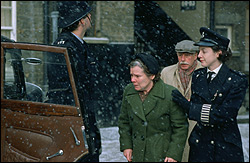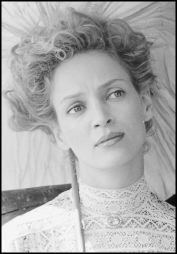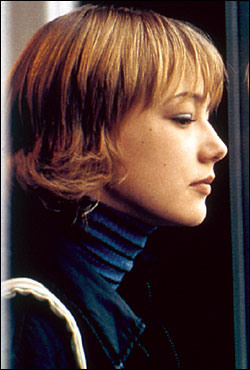Making her way home after cleaning posh houses down to their last gleaming bit of brass, Vera Drake (Imelda Staunton) sings sweetly to herself near the beginning of Vera Drake (which opens Fri., Oct. 22, at the Harvard Exit). Here in 1950, Londoners still carry scars from the blitz, rationing is the order of the day, and the city has a pinched wintry look, no matter the season. Vera’s instinctive response is to hold her family closer and do as much as she can for others: popping in to check on an elderly wheelchair-bound neighbor, bringing home a gormless bachelor from the block to feed him properly.
With her round eyes, her tea-cozy shape, her essential Englishness, she’s like something out of Beatrix Potter, although shortly we discover that kind, twinkling, motherly Vera is a veritable Mrs. Tiggy-Winkle of abortionists, dispensing relief, not clear starch.
With his faith in Vera’s essential goodness and Staunton’s devastating performance, writer-director Mike Leigh leaves no doubt where his feelings lie about abortion rights, but he’s more interested in the ripple effect of Vera’s occupation than in fashioning a tract. The result is drama that ranks with Topsy-Turvy and Secrets and Lies as Leigh’s very best. (Unsurprisingly, it took best film and best actress awards at Venice in September.)
Vera’s work is her secret. Her family hasn’t a clue that the warm center of their lives is anything but what she seems. For the first third of the film, Leigh patiently builds the family relationships. We see how close Vera and her erect, white- mustached husband, Stan (Phil Davis), are; and how much flows back and forth between them and their grown children, still living at home: Sid (Daniel Mays), an apprentice tailor, and painfully shy Ethel (Alex Kelly), who works on a factory assembly line.
Watching Ethel blossom is one of those tender Leigh touches, as Vera’s stray bachelor, Reg (Eddie Marson), finds his footing within the household and begins walking with Ethel. In her unexpected smile, her look of blinding happiness, we see she’s all Vera.
In for semicomic relief is Auntie Joyce (Heather Craney), married to Stan’s look-alike brother, Frank (Adrian Scarborough), at whose garage Stan works. Nakedly acquisitive, Joyce has stopped just short of a turnstile in the bedroom: Every sexual “favor” for poor tired Frank comes with a price; with her eye on a washing machine, she pulls out a satin nightgown and all the stops.
Leigh’s interest in the sexual standards of these bad old days provides anguished snapshots of Vera’s “girls”—all ages, all colors, almost all terrified. One is hysterical with self-blame (“I’m a bad, bad person!”). Another, already the mother of seven, has Vera come round to the house while her drunken husband sleeps it off in the other room.
Inevitably, the law of averages catches up with Vera, when one young woman almost dies, and a trio of police arrives at the Drakes’ apartment—precipitously on the night the whole family is assembled to celebrate Ethel and Reg’s engagement. Vera, who knows instantly why they’re there, is the soul of cooperation, although she cannot possibly form the words to tell Stan why they’re taking her to the police station. The family is left in limbo while the police try to extract even the simplest facts from Vera.
This large, gray-haired detective inspector (impeccable Peter Wight) and his increasingly empathetic woman officer are an example of Leigh’s evenhandedness. In short order, as Vera wrenchingly answers their questions, they realize what they have on their hands: a blindingly well-intentioned woman who, for the better part of 20 years, in absolute secrecy and for no money, has done what she could to “help girls out” and whose only thought is for the humiliation and the shame she’s brought on her family. Their official stance wilts in the face of Vera’s words, much less Vera herself; no line is crossed, but there is an atmospheric change in the room.
What remains is a working out of our worst fears, beyond her courtroom struggles: When at last they learn the truth, who in Vera’s family will stand by her and who will fall away? I cannot remember a drama, especially a realistic, kitchen-sink one, with this much tension. You run anxiously through the characters in your mind: Stan seems supportive, although there’s that ramrod back and that army experience—can he make the leap? How about his brother, with that garage to lose? One vote is a real shocker, going against everything you might imagine. Another reveals an unexpected depth of humanity that comes from hard-bitten experience. Although he has crucially stacked his deck in casting Staunton (his own Falconetti), Leigh gives every shade of opinion a voice.
As always, Leigh’s ensemble is a chamber orchestra of virtuosos. However long he rehearses them (and it’s long), every second’s experience is up there on the screen. Dick Pope, Leigh’s habitual cinema- tographer, wrings every bit of prettiness from the setting and replaces it with images of working-class rectitude that can break your heart; and there should be a special award to costume designer Jacqueline Durran, for every stitch, especially that round hat that never leaves Vera’s head. Finally, a warning: Those who hare out before the credits will miss the skeleton key to Vera Drake. “In loving memory of my parents,” Mike Leigh writes, “a doctor and a midwife.”








